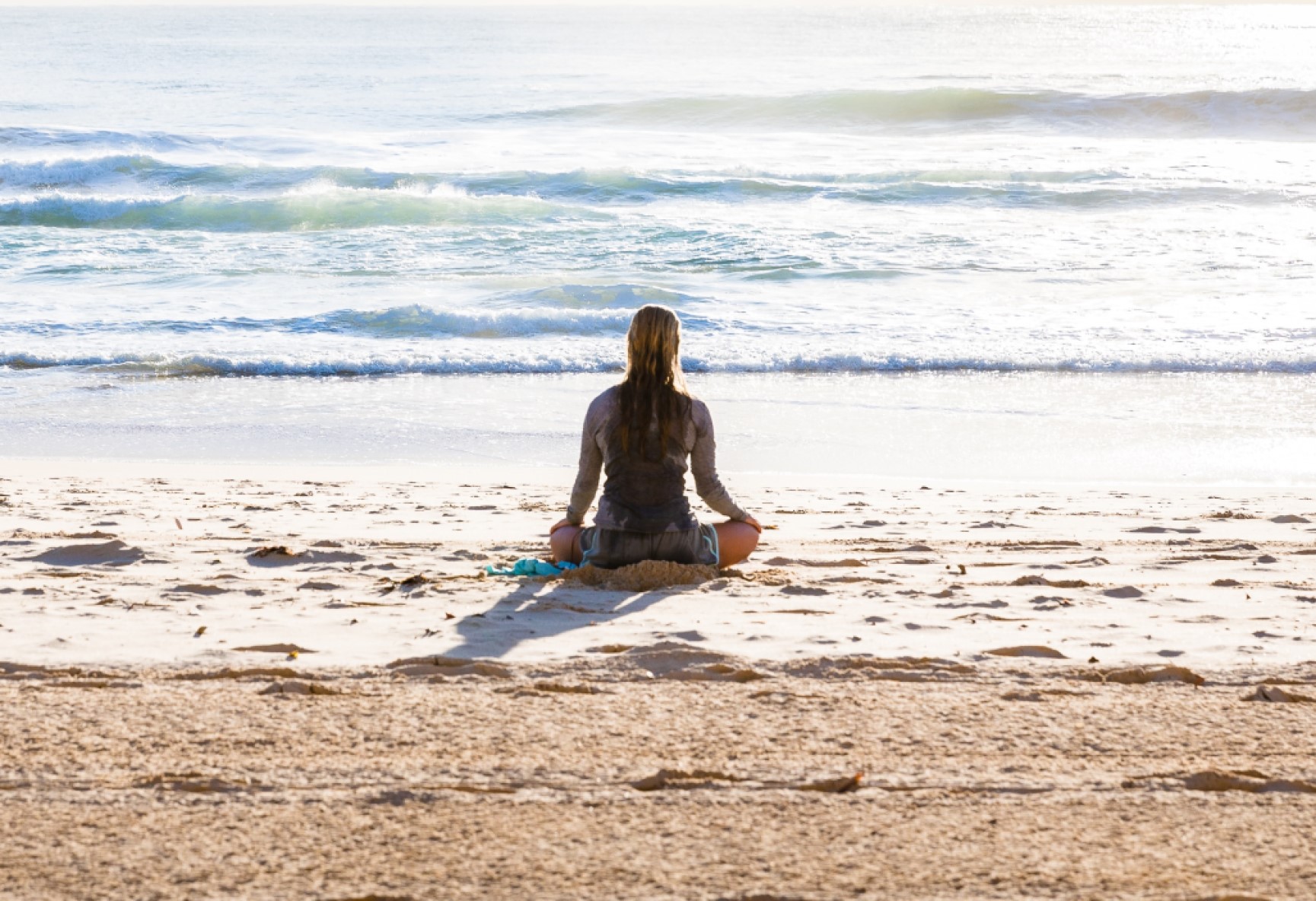Meditation was once considered a practice reserved for religious or spiritual enthusiasts only. These days, however, we know better. Meditation is now being accepted by scientists and medical experts worldwide. It is being promoted as an effective tool for helping relieve stress, cultivate self-awareness, stimulate brain function and even help manage chronic pain. It has also been proven to be a useful tool in helping manage certain mental health conditions, such as anxiety, post-traumatic stress disorder PTSD and depression.
The concept of meditation has been around for thousands of years, and though the exact origin or chronology is unknown, there are artworks depicting people seated in meditation, dated as far back as 5000 BC. Written evidence dates back as early as 1500 BC, in the ancient Indian scriptures, known as the Vedas.
Over the centuries, different forms of meditation began to emerge. The word spread about the benefits of cultivating self-awareness, and meditation was introduced to western countries, across Europe, America and then worldwide.
Today the practice of meditation, and mindfulness, is continuing to rise in popularity. This peak in interest, as well as the claims of the many benefits to be gained, both physically and psychologically, has prompted numerous scientific studies.
One such study was performed at the University of Massachusetts Medical School, by Jon Kabat-Zinn. It involved a group of employees who worked in a high-tech firm, in Wisconsin. The group was randomly divided into two, and one group practised regular meditation for four months. This group showed a pronounced shift in brainwave activity from the stress-prone right frontal cortex to the calmer left frontal cortex.
This is one of many studies that have indicated that meditation does indeed help to reduce stress.
So, what exactly is meditation?
Meditation is a practice where the attention is focused on a specific thought, object, or activity, to help achieve a mentally clear, calm and stable state of mind.
Transcendental meditation originated from the Vedas, and Mindfulness meditations (sometimes referred to as Zen or Vipassana meditations) have their roots in Buddhism. From these foundations, many other types of meditations have evolved.
Some are designed to help stimulate the mind in certain areas, such as creativity, problem-solving and memory retention. Whilst other meditations are designed to help manage issues such as stress, negative emotions, phobias, addictions and ruminating thoughts.
There are various techniques used within meditations, including:
- breath awareness
- body scanning
- sensation awareness
- thought awareness
- mantra repetition
- guided visualisations
- fixed gaze concentration
What benefits can be gained through meditation?
One of the most recognised benefits of meditation is relaxation and stress management.
Stress can have a serious impact on your physical body, by increasing the levels of the stress hormone ‘cortisol’. Increases in cortisol can stimulate the production of inflammation-promoting chemicals called ‘cytokines’. These cytokines can increase blood pressure, disrupt sleep and contribute to fatigue.
Meditation has been proven to be a useful tool in reducing this inflammation response and helping lower blood pressure. It has also been shown to help combat insomnia by promoting regular sleeping patterns and is sometimes used in the management of chronic pain and to help alleviate symptoms of addiction withdrawal.
Neuroscientists can now prove that people who meditate are able to shift their brainwaves to other areas in the cortex. In doing this, people who meditate can decrease the effects of stress, anxiety and mild depression.
Meditation promotes focus, concentration and memory retention, and can also help encourage positive emotions such as compassion, contentment, patience and gratitude.
Another significant benefit of regular meditation practice is the cultivation of mindfulness.
Mindfulness, or self-awareness, enables people to become more aware of the variations in their emotional state. This then helps in becoming less reactive to negative thoughts, or emotionally confronting situations, which in turn, promotes a happier and more confident mindset.
Debunking meditation myths
Misleading information has a way of turning people off the idea of trying new things and meditation is no exception. Here are four of the most common misconceptions surrounding meditation:
You have to be religious to practice meditation: Just as exercises are forms of active movement designed to keep your body strong and healthy, meditations are practices that utilize techniques to keep your mind strong and healthy. Even though some religions may use variations of meditation as part of their worshipping, meditation itself is secular and not a religious practice.
You have to sit in an uncomfortable position to meditate: This idea probably came about from depictions of monks or yogis sitting in challenging variations of cross-legged poses whilst meditating. However, meditation can be done from any position, as long as you are comfortable and able to follow the practice with awareness. There are even some meditations that have been designed to be practised whilst walking or travelling on public transport.
You have to be completely still to meditate: As mentioned above, some meditations are designed to be practised whilst walking, whilst other meditations, such as Qi Gong, or Tai Chi are specifically focused on meditative movement. The purpose of trying to sit or lay still, for most other forms of meditation, is to support the process of internalising your attention. This is because each time you move, your attention is going to be distracted a little. That being said, if you need to scratch an itch, or stretch out a leg whilst meditating, this is ok, it happens to everyone!
Your mind will become blank when you meditate: This is a misconception that often leaves first-time meditators feeling frustrated or disappointed. The idea of meditation is not to stop your mind from thinking, but instead help you learn how to be less distracted by your different thoughts and feelings. They work by helping you develop the ability to observe yourself with a quality of non-reactivity. So that you can become aware of the different thoughts and feelings, as they arise, without being too affected by them.
Real-Life Stories
To put into perspective some of these above benefits of meditation, let me tell you the story of a 32-year-old woman named Jenna, who has dealt with anxiety most of her life. Self-doubt and other anxious thoughts had left Jenna feeling isolated and had prevented her from pursuing many of her dreams.
Until one day Jenna attended her first meditation class. She was so overwhelmed by the calming effect it had on her mind, she began to attend the classes regularly. Jenna found that meditation helped her step back from the experience of anxious thoughts and gain some healthy perspective. This helped empower her to take back control of her life and pursue her dreams with confidence.
If you would like to read more about Jenna, and how she learned to manage her anxiety with meditation, her story is available in the Comprosition Story Repositories.
My thoughts:
Through the regular practice of meditation, I have observed myself become much more present in my own life. It has not only enabled me to have a greater understanding of myself, but it has also helped empower me to live my life the way I want to.
However, it didn’t just happen overnight. The key is consistency.
The mind is like a muscle. It needs to be exercised and trained regularly so that it can function at its optimal level. The more often you practice meditation, the more natural the process becomes. You will find that over time, with the regular practice of meditation, you will be able to slip into a relaxed state more easily. You will also notice yourself becoming more mindful and aware in everyday life.
If you find you struggle to practise meditation regularly, why not try and set yourself an achievable goal, for example, you could try practising meditation for 15 minutes twice a week?
Comprosition Goal Setting Expert Tracy Shephard suggests setting specific, realistic and attainable goals is an excellent way of working towards achieving positive change and gaining a positive sense of control in your life.
Meditation is a fantastic tool for helping you to regain a sense of understanding and control in your life, by helping give you a little healthy perspective. It has done wonders for enhancing my quality of life and I feel confident it can do the same for you!
*Please note: This blog is for education purpose only. If you are experiencing clinical depression, please reach out to your health professional. Some forms of meditation might not be recommended for people with introverted mental health disorders.
Sources:
Li-Chuan Chu (2009) The benefits of meditation vis-a-vis emotional intelligence, perceived stress and negative mental health. Stress and Health <https://doi.org/10.1002/smi.1289 >
Sala Horowitz (2010) The Health Benefits of Meditation: What the Newest Research Shows. Alternative and Complementary Therapies <https://doi.org/10.1089/act.2010.16402 >
Sumter, M. T., Monk-Turner, E., Turner, C. (2009). The Benefits of Meditation Practice in the Correctional Setting. Journal of Correctional Health Care <https://doi.org/10.1177/1078345808326621>
Edo Shonin, William Van Gordon, Mark D Griffiths. ( 2013) Meditation as medication: are attitudes changing? British Journal of General Practice <https://doi.org/10.3399/bjgp13X675520>




































